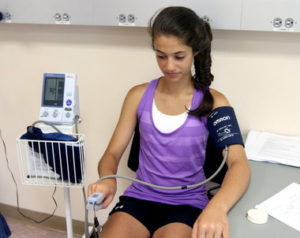 Help Your Teen Cope With Stress 10-25-2017
Help Your Teen Cope With Stress 10-25-2017
This months guest blog is from a person with whom I’m more impressed every time he submits a piece. If you’re interested in what testosterone does or you simply want to understand more about why your teenage princess seems so sad all the time, this is the blog for you. From Jason Lewis:
Help Your Teen Cope With Stress
The challenges and everyday stress of adolescence are nothing new, but the nature of that anxiety and its prevalence has changed in recent years. Teens are faced with increasing pressure, and with this load that teens bear, parents and teens both need to be aware of how
they can address it now to prevent problems in the future.
Everyday stress or anxiety?
Everyone experiences stress at some point, and adolescence is a time when stress tends to be high. According to Psychology Today, teens are often stressed but they aren’t always aware of how stress affects their health. Parents play a key role in recognizing signs of stress and intervening when their teen needs a little extra help coping. Some of the things parents should look out for are irritability, anger, sadness and crying, and noticeable changes in their habits.
 It’s important to note that boys and girls tend to experience mood disorders, including stress, in different ways. Hormones may be to blame for the differences with 70% of females considered at-risk of depression compared to just 9% of males. Additionally, three million women each year are diagnosed with premenstrual dysphoric disorder. Males are more likely to present with anger management issues as elevated testosterone levels increase the brain’s response to threats, real and perceived.
It’s important to note that boys and girls tend to experience mood disorders, including stress, in different ways. Hormones may be to blame for the differences with 70% of females considered at-risk of depression compared to just 9% of males. Additionally, three million women each year are diagnosed with premenstrual dysphoric disorder. Males are more likely to present with anger management issues as elevated testosterone levels increase the brain’s response to threats, real and perceived.
 When it comes to managing everyday stress, some tips that help teens cope include getting
When it comes to managing everyday stress, some tips that help teens cope include getting
plenty of rest, staying active, and engaging in activities they enjoy. Teens benefit from taking some control of the situation, and parents can work with them to give them the nudge they need to move in the right direction. The American Academy of Pediatrics has a great strategy that teens can use to develop their own personal stress-management plan. This is empowering to stressed-out teens at a time when so much in their lives often feels out of control.
 For teens and their parents who feel worry has become overwhelming, it’s important to
For teens and their parents who feel worry has become overwhelming, it’s important to
determine whether they’re experiencing everyday stress or anxiety. With anxiety, it’s common to not only feel emotionally stressed but to also have physical signs, like your heartbeat racing, fast breathing, tension in your muscles and a feeling of shakiness or trembling. Anxiety is a very common mental health condition, and if your teen is experiencing anxiety, the healthiest thing you can do for them is to acknowledge it. This is a crucial first step because ignoring anxiety won’t make it go away. Finding ways to cope with it now not only impacts their current mental health but can prevent more serious problems in the future.
 Reasons for anxiety and resources
Reasons for anxiety and resources
Teens who are anxious often withdraw from activities they used to enjoy, and they may also fall
behind in school. According to The Atlantic, the competition teens experience in school and
sports, along with social pressure, is increasingly leading them to show signs of anxiety at
school. School counselors are seeing this more frequently, which means they are now better
trained and prepared to help. As a parent, if your teen is experiencing anxiety, make sure they know their school counselor is a valuable resource and can help if they’re feeling anxious at school.
 A teen’s social network and social interactions also tend to weigh heavily on them: the school they attend, the neighborhood you live in, the sports teams they’re on…it can all make an impact. It’s no surprise that social situations play a huge role in teens developing anxiety. A study published by The New York Times has found a remarkably simple yet effective way to help teens cope with social stress. In the study, they conducted writing exercises with teens that involved simple affirmations that people can change. This exercise helped them develop a resilience to upsetting social situations, helping them realize that it wouldn’t last forever. This awareness is an incredible skill to develop in the tough teen years, and it’s one that will also help them be successful later on in life as they face other challenges.
A teen’s social network and social interactions also tend to weigh heavily on them: the school they attend, the neighborhood you live in, the sports teams they’re on…it can all make an impact. It’s no surprise that social situations play a huge role in teens developing anxiety. A study published by The New York Times has found a remarkably simple yet effective way to help teens cope with social stress. In the study, they conducted writing exercises with teens that involved simple affirmations that people can change. This exercise helped them develop a resilience to upsetting social situations, helping them realize that it wouldn’t last forever. This awareness is an incredible skill to develop in the tough teen years, and it’s one that will also help them be successful later on in life as they face other challenges.
 Learning these coping skills now is essential to your teen’s current wellbeing and future
Learning these coping skills now is essential to your teen’s current wellbeing and future
success. If anxiety is left untreated, teens are at greater risk of suicidal thoughts and actions, as well as substance abuse. Girls are at an exceptionally higher risk to mood disorders. Anxiety can make a person feel trapped, and if your teen doesn’t develop healthy ways of coping, they may be more likely to seek substances as a way out. Your role as a parent is to guide them, support them, and get connected to resources to learn these coping mechanisms so they don’t feel helpless.
Until next time, keep your homes well.
Welcome Occupational Parenting Health and Happiness The Human Element The Perceivable Universe The Environment Word Play Conclusion Glossary In The Kitchen Pets Tips Cleaning Tips Parenting Tips Blog